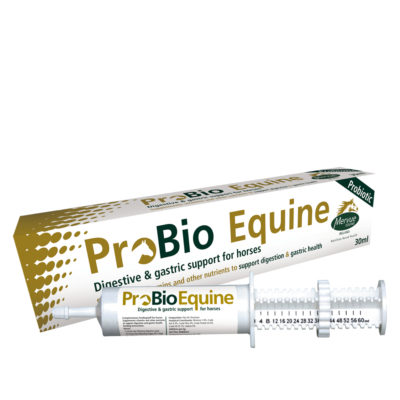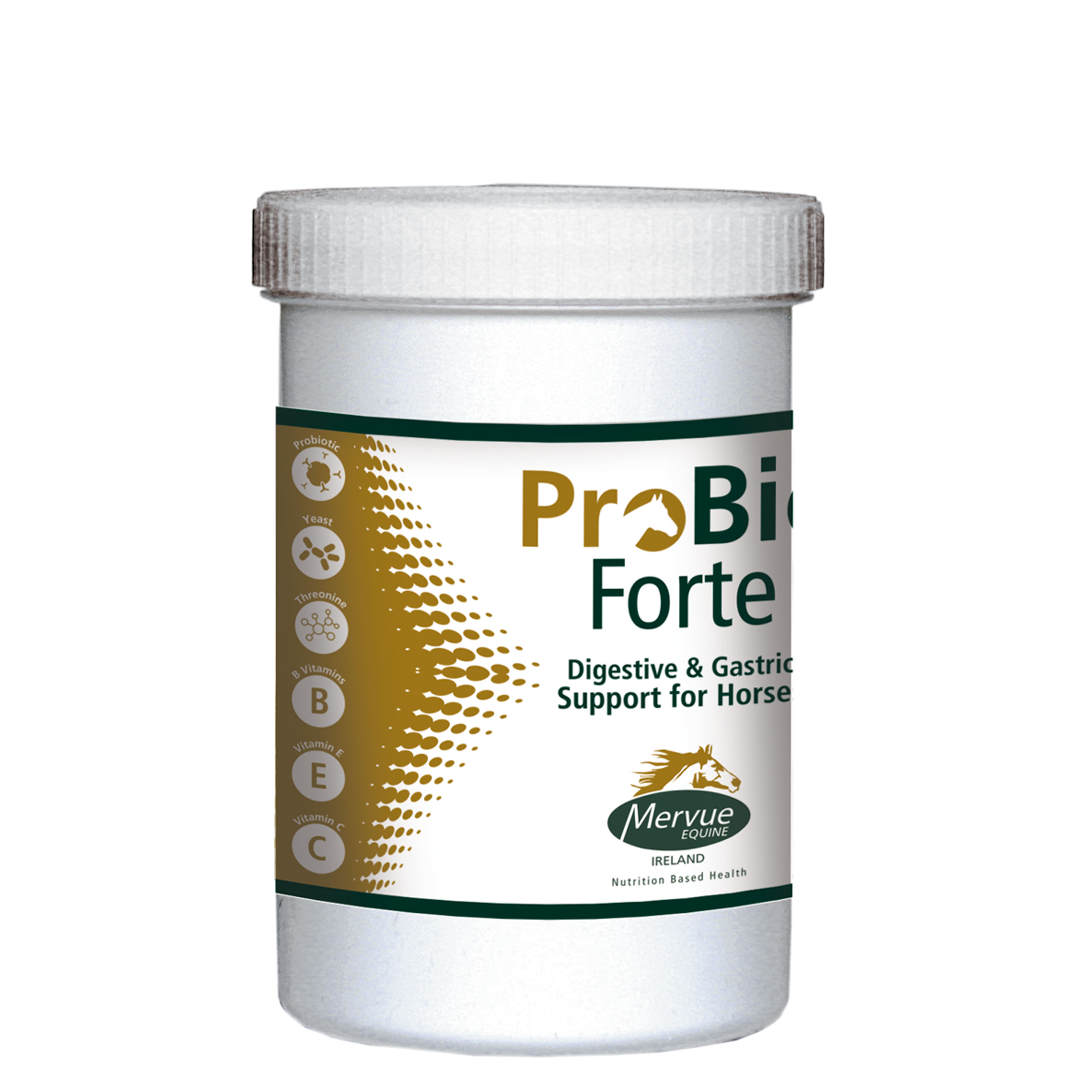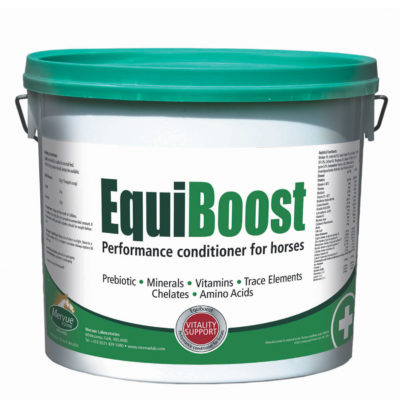- +353 21 422 0397
- info@mervue.ie
- Mon - Fri: 09:00 - 17:00
Intestinal dysbiosis refers to an imbalance between good bacteria and bad bacteria in the intestine of the horse. A healthy population of good bacteria (called microflora) are required for the efficient digestion of food and the manufacture of short-chain fatty acids such as propionate, acetate and butyrate that are converted to energy in the liver. A healthy intestinal microflora also synthesis many of the vitamins required for generating energy from carbohydrates, fats and proteins. A balanced and healthy microflora also stimulates the gastrointestinal immune system and prevents the adhesion of bad pathogenic bacteria to the intestinal wall. Sudden changes in diet from feeding grass to feeding of rapidly fermentable, high carbohydrate diets are common practices in the horse industry and have been associated with digestive and metabolic disorders that can impair the performance of horses. Abrupt changes in diet don’t allow sufficient time for the microflora to adapt to the high carbohydrate diet and thus undigested carbohydrates can enter the large intestine in large quantities leading to hindgut acidosis and predisposing horses to the development of acute or subacute laminitis or colitis. Dysbiosis also leads to suboptimal digestion of carbohydrates and thus reduced energy derived from food. Travelling can also cause intestinal dysbiosis in horses, which has been reported after just two hours of transport. Horses that are exercised for prolonged periods of time or in high ambient temperatures and humidity are prone to overheating and one of the first organs damaged by hyperthermia is the intestinal tract. Diarrhoea and loss of integrity of the intestinal mucosae are frequently seen in cases of hyperthermia.
RECOMMENDATION: PRO-BIO EQUINE and PRO-BIO FORTE
 PRO-BIO EQUINE (paste) and PRO-BIO FORTE (powder) contain a live probiotic yeast called Saccharomyces and in horses fed high-starch (grain) diets, live yeast supplementation appears to limit the extent of undesirable changes in the intestinal microbial population. Yeast probiotic has also been shown to benefit the intestinal microbial population after just two hours of travelling. Saccharomyces has also been demonstrated to improve the digestibility of food in horses.
PRO-BIO EQUINE (paste) and PRO-BIO FORTE (powder) contain a live probiotic yeast called Saccharomyces and in horses fed high-starch (grain) diets, live yeast supplementation appears to limit the extent of undesirable changes in the intestinal microbial population. Yeast probiotic has also been shown to benefit the intestinal microbial population after just two hours of travelling. Saccharomyces has also been demonstrated to improve the digestibility of food in horses.
 The B vitamins included in PRO-BIO EQUINE and PRO-BIO FORTE support the metabolism of carbohydrates, fats and proteins to produce energy and vitamins E and C are potent antioxidants which help to protect the intestinal wall from damage caused by bad bacteria in cases of intestinal dysbiosis. Many horses go off their feed or have interrupted feeding patterns while travelling or performing the B vitamins in PRO-BIO EQUINE and PRO-BIO FORTE help to stimulate appetite so that good tissue levels of carbohydrates, fats and proteins are maintained prior to performing. PRO-BIO EQUINE and PRO-BIO FORTE contain threonine which is the main component of the mucous lining the intestinal tract and protecting the intestinal cells from damage from bad bacteria or toxins.
The B vitamins included in PRO-BIO EQUINE and PRO-BIO FORTE support the metabolism of carbohydrates, fats and proteins to produce energy and vitamins E and C are potent antioxidants which help to protect the intestinal wall from damage caused by bad bacteria in cases of intestinal dysbiosis. Many horses go off their feed or have interrupted feeding patterns while travelling or performing the B vitamins in PRO-BIO EQUINE and PRO-BIO FORTE help to stimulate appetite so that good tissue levels of carbohydrates, fats and proteins are maintained prior to performing. PRO-BIO EQUINE and PRO-BIO FORTE contain threonine which is the main component of the mucous lining the intestinal tract and protecting the intestinal cells from damage from bad bacteria or toxins.
 EQUIBOOST is the number one foundation supplement in the World. It is a powder containing 26 different vitamins and minerals as well as a prebiotic, omega 3 oil and amino acids. Fructo-oligosaccharides (FOS) are prebiotics which essentially provide a nutrient source for the good bacterial microflora in the intestine and help to maintain a healthy intestinal microflora. EQUIBOOST contains flax oil which is rich in α -linoleic acid, ALA (an omega 3 fatty acid). ALA is found in large amounts in fresh grass and has been shown to positively influence the immune response in horses. Horses with limited access to fresh grass may benefit from flaxseed supplementation. ALA is converted to docosahexaenoic acid (DHA) in the body which is then incorporated into muscle and other tissues and has been demonstrated to improve the inflammatory status and reduce pain and inflammation in humans.
EQUIBOOST is the number one foundation supplement in the World. It is a powder containing 26 different vitamins and minerals as well as a prebiotic, omega 3 oil and amino acids. Fructo-oligosaccharides (FOS) are prebiotics which essentially provide a nutrient source for the good bacterial microflora in the intestine and help to maintain a healthy intestinal microflora. EQUIBOOST contains flax oil which is rich in α -linoleic acid, ALA (an omega 3 fatty acid). ALA is found in large amounts in fresh grass and has been shown to positively influence the immune response in horses. Horses with limited access to fresh grass may benefit from flaxseed supplementation. ALA is converted to docosahexaenoic acid (DHA) in the body which is then incorporated into muscle and other tissues and has been demonstrated to improve the inflammatory status and reduce pain and inflammation in humans.